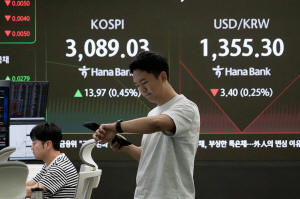Asian shares mostly higher after US stocks hit another record as Tesla
and Nike rally
[July 03, 2025] By
TERESA CEROJANO
MANILA, Philippines (AP) — Asian shares mostly gained on Thursday after
U.S. stocks hit another all-time high.
U.S. futures edged up while oil prices fell.
Tokyo’s Nikkei 225, which fluctuated between gains and losses during the
day, added 0.1% to 39,785.90. In South Korea, the Kospi added 1.3% to
3,116.27, while Australia’s S&P/ASX 200 slipped 0.1% to 8,589.80.
The Hong Kong’s Hang Seng index lost 0.7% to 24,056.77. The Shanghai
Composite index added 0.2% to 3,460.15.
Taiwan's TAIEX gained 1.3% while India's Sensex rose 0.2%. Vietnam's
VNINDEX added 0.4%.
Mizuho Bank, Ltd., in a commentary, said there is lopsided optimism
about Vietnam’s deal with the US, with Vietnamese imports subject to 20%
tariffs in return for 0% tariffs on U.S. goods.
“A higher 40% tariff on goods deemed to be transshipped via Vietnam
could accentuate risks to and from China,” it said, adding that “other
Asian economies will be particularly vulnerable to a two-sided
geoeconomic squeeze given that their reliance on both China and U.S. are
significant.” President Donald Trump said on Wednesday that he reached a
deal with Vietnam, where U.S. products sold in the country will face
zero tariffs and Vietnamese-made goods will face a U.S. tariff of 20%.
That helped companies that import lots of things from Vietnam, including
Nike, whose stock rose 4.1%. Factories in Vietnam made half of all Nike
brand footwear in its fiscal year of 2024. The S&P 500 rose 0.5% and set
a record for the third time in four days. The Dow Jones Industrial
Average edged down by 10 points, or less than 0.1%, and the Nasdaq
composite gained 0.9%.

Tesla helped drive the market higher and rose 5% after saying it
delivered nearly 374,000 of its Model 3 and Model Y automobiles last
quarter. That was better than analysts expected, though the
electric-vehicle maker’s overall sales fell 13% from a year earlier.
Worries have been high that CEO Elon Musk’s involvement in politics is
turning off potential Tesla buyers.
Constellation Brands climbed 4.5% despite reporting a weaker profit for
the latest quarter than analysts expected. It pointed to slowing growth
for jobs in the construction industry and other “4000 calorie+” sectors,
which tends to hurt demand for its beer.
But the company selling Modelo beer and Robert Mondavi wine nevertheless
stuck with its financial forecasts for the full upcoming year.
They helped offset a 40.4% drop for Centene. The health care company
withdrew its forecasts for profit this year after seeing data that
suggests worse-than-expected sickness trends in many of the states where
it does business. It was the worst day for the stock since its debut in
2001.
[to top of second column] |

A currency trader works near a screen showing the Korea Composite
Stock Price Index (KOSPI) and the foreign exchange rate between U.S.
dollar and South Korean won, top right, at the foreign exchange
dealing room of the KEB Hana Bank headquarters in Seoul, South
Korea, Thursday, July 3, 2025. (AP Photo/Ahn Young-joon)

All told, the S&P 500 rose 29.41 points to 6,227.42. The Dow Jones
Industrial Average slipped 10.52 to 44,484.42, and the Nasdaq composite
climbed 190.24 to 20,393.13.
In the bond market, Treasury yields were mixed ahead of a highly
anticipated report on Thursday, which will show how many jobs U.S.
employers created and destroyed last month. The widespread expectation
is that they hired more people than they fired but that the pace of
hiring slowed from May.
A stunningly weak report released Wednesday morning raised worries that
Thursday’s report may fall short. The data from ADP suggested that U.S.
employers outside the government cut 33,000 jobs from their payrolls
last month, when economists were expecting to see growth of 115,000
jobs.
The ADP report does not have a perfect track record predicting what the
U.S. government’s more comprehensive jobs report will say each month.
That preserves hope that Thursday’s data could be more encouraging. But
a fear has been that uncertainty around President Donald Trump’s tariffs
could cause employers to freeze their hiring.
Many of Trump’s stiff proposed taxes on imports are currently on pause,
and they’re scheduled to kick into effect in about a week. Unless Trump
reaches deals with other countries to lower the tariffs, they could hurt
the economy and worsen inflation.
Other factors could also be dragging on the job market, such as the U.S.
government’s termination of protected status for 350,000 Venezuelans,
potentially exposing them to deportation. That alone could create a drag
on payrolls of 25,000 jobs, according to Goldman Sachs economist David
Mericle, whose forecast for Thursday’s report is weaker than many of his
peers.
In other dealings on Thursday, the benchmark U.S. crude lost 60 cents to
$66.85. Brent crude, the international standard, shed 58 cents to
$68.53. The dollar was trading at 143.81 Japanese yen, up from 143.65
yen. The euro rose to $1.1795 from $1.1790.
All contents © copyright 2025 Associated Press. All rights reserved
 |